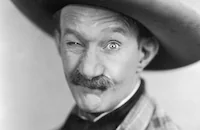Night Owls (1930) begins in mid-crime wave, with police officer Kennedy (Edgar Kennedy) being commanded by his chief (Anders Randolf) to stop the string of home burglaries. Kennedy hatches a plot to make himself the hero by staging a burglary (of the chief's house, no less) and then capturing the perpetrators red-handed. Unfortunately, the only accomplices he can find are a couple of men asleep on a park bench (Laurel and Hardy).
This sets in motion a painfully funny comedy of errors, in which the would-be home invaders barely manage to cross the threshold, crashing garbage cans, tearing trousers and absent-mindedly locking themselves out of the house they've just broken into.
Night Owls was directed by James Parrott. A veteran slapstick actor with more than 120 silent comedies to his credit (usually under the name Paul Parrott), Parrott began directing in 1921, and continued to dabble in it for a few years. But it was in 1926, after appearing in George Jeske's The Old War-Horse (opposite "Snub" Pollard), that Parrott fully devoted himself to directing, retiring from acting and planting himself in the director's chair for the next nine years.
The younger brother of Roach comedian Charley Chase, Parrott first limited himself to his older sibling's films, before beginning a long and fruitful collaboration with Laurel and Hardy in 1928 (beginning with Their Purple Moment). Among the best-remembered Laurel, Hardy and Parrott films are Two Tars (1928) and The Music Box (1932), which won the Academy Award for Best Comedy Short and was honored by the National Film Preservation Board in 1997.
During the 1930s, Parrott's career derailed when he became dependent upon alcohol and, according to some sources, cocaine. By 1937, he was considered unemployable and died of an intentional drug overdose on May 10, 1939.
Director: James Parrott
Producer: Hal Roach
Screenplay: H.M. Walker and (uncredited) Leo McCarey
Cinematography: George Stevens
Music: Marvin Hatley, Harry von Tilzer (uncredited)
Cast: Stan Laurel (Stanley), Oliver Hardy (Oliver), Edgar Kennedy (Officer Kennedy), James Finlayson (Meadows), Anders Randolf (Police Chief).
BW-20m.
by Bret Wood
Night Owls

Brief Synopsis
In this short film, two vagrants try to help a police officer save his reputation.
Cast & Crew
Read More
James Parrott
Director
Stan Laurel
Oliver Hardy
Charles Mcmurphy
James Finlayson
Anders Randolph
Film Details
Genre
Short
Comedy
Release Date
1930
Production Company
Hal Roach Studios, Inc.
Distribution Company
Metro-Goldwyn-Mayer Studios Inc.
Technical Specs
Duration
20m
Synopsis
In this short film, two vagrants try to help a police officer save his reputation.
Director
James Parrott
Director
Film Details
Genre
Short
Comedy
Release Date
1930
Production Company
Hal Roach Studios, Inc.
Distribution Company
Metro-Goldwyn-Mayer Studios Inc.
Technical Specs
Duration
20m
Articles
Night Owls

Night Owls
Night Owls (1930) begins in mid-crime wave, with police officer Kennedy (Edgar Kennedy) being commanded by his chief (Anders Randolf) to stop the string of home burglaries. Kennedy hatches a plot to make himself the hero by staging a burglary (of the chief's house, no less) and then capturing the perpetrators red-handed. Unfortunately, the only accomplices he can find are a couple of men asleep on a park bench (Laurel and Hardy).
This sets in motion a painfully funny comedy of errors, in which the would-be home invaders barely manage to cross the threshold, crashing garbage cans, tearing trousers and absent-mindedly locking themselves out of the house they've just broken into.
Night Owls was directed by James Parrott. A veteran slapstick actor with more than 120 silent comedies to his credit (usually under the name Paul Parrott), Parrott began directing in 1921, and continued to dabble in it for a few years. But it was in 1926, after appearing in George Jeske's The Old War-Horse (opposite "Snub" Pollard), that Parrott fully devoted himself to directing, retiring from acting and planting himself in the director's chair for the next nine years.
The younger brother of Roach comedian Charley Chase, Parrott first limited himself to his older sibling's films, before beginning a long and fruitful collaboration with Laurel and Hardy in 1928 (beginning with Their Purple Moment). Among the best-remembered Laurel, Hardy and Parrott films are Two Tars (1928) and The Music Box (1932), which won the Academy Award for Best Comedy Short and was honored by the National Film Preservation Board in 1997.
During the 1930s, Parrott's career derailed when he became dependent upon alcohol and, according to some sources, cocaine. By 1937, he was considered unemployable and died of an intentional drug overdose on May 10, 1939.
Director: James Parrott
Producer: Hal Roach
Screenplay: H.M. Walker and (uncredited) Leo McCarey
Cinematography: George Stevens
Music: Marvin Hatley, Harry von Tilzer (uncredited)
Cast: Stan Laurel (Stanley), Oliver Hardy (Oliver), Edgar Kennedy (Officer Kennedy), James Finlayson (Meadows), Anders Randolf (Police Chief).
BW-20m.
by Bret Wood

















